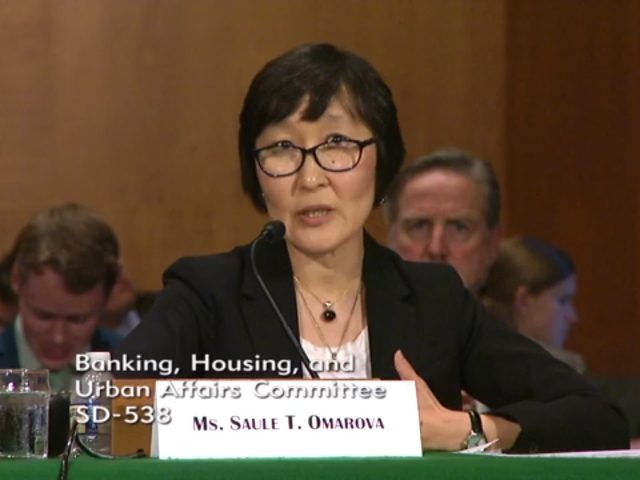Saule Omarova, Kazakhstan—born U.S. citizen and law professor at Cornell University, has a history of writings that reveal a radical ideology, including a thesis she wrote at Moscow State University titled “Karl Marx’s Economic Analysis and the Theory of Revolution in Das Kapital.”
Omarova has not shared the content of that thesis, despite requests from the Senate Banking and Housing Committee, which is considering her nomination.
As Comptroller of the Currency, Omarova would have considerable influence over federal financial policy and how she might take on that role is revealed in a 2020 paper she wrote titled “The People’s Ledger: How to Democratize Money and Finance the Economy.” Breitbart News first reported on the paper.
The abstract of the article reads:
The COVID-19 crisis underscored the urgency of digitizing sovereign money and ensuring universal access to banking services. It pushed two related ideas—the issuance of central bank digital currency and the provision of retail deposit accounts by central banks—to the forefront of the public policy debate. To date, however, the debate has not produced a coherent vision of how democratizing access to central bank money would—and should—transform and democratize the entire financial system. This lack of a systemic perspective obscures the enormity of the challenge and dilutes our ability to tackle it.
This Article takes up that challenge. It offers a blueprint for a comprehensive restructuring of the central bank balance sheet as the basis for redesigning the core architecture of modern finance. Focusing on the U.S. Federal Reserve System (the Fed), the Article outlines a series of structural reforms that would radically redefine the role of a central bank as the ultimate public platform for generating, modulating, and allocating financial resources in a democratic economy—the People’s Ledger.
On the liability side of the ledger, the Article envisions the complete migration of demand deposit accounts to the Fed’s balance sheet and explores the full range of new, more direct and flexible, monetary policy tools enabled by this shift. On the asset side, it advocates a comprehensive qualitative restructuring of the Fed’s investment portfolio, which would maximize its capacity to channel credit to productive uses in the nation’s economy. This compositional overhaul of the Fed’s balance sheet would fundamentally alter the operations and systemic footprints of private banks, funds, derivatives dealers, and other financial institutions and markets. Analyzing these structural implications, the Article shows how the proposed reforms would make the financial system less complex, more stable, and more efficient in serving the long-term needs of the American people.
Matthew Continetti, a resident fellow at the American Enterprise Institute, wrote about that paper for the Washington Free Beacon:
Like utopian socialists of old, Omarova “envisions the complete migration of demand deposit accounts to the Fed’s balance sheet.” She proposes a “comprehensive qualitative restructuring of the Fed’s investment portfolio, which would maximize its capacity to channel credit to productive uses in the nation’s economy.” Guess who gets to decide which uses are productive.
The result, Omarova concludes, would be a financial system that is “less complex” than it is today. Which I suppose is true, since a government monopoly is “less complex” than market competition.
Continetti also included some of Omarova’s social media posts.
“Say what you will about old USSR,” Omarova tweeted on March 31, 2019, “there was no gender pay gap there. Market doesn’t always ‘know best.’”
“Well, one can say a lot about “old USSR” — how it was a force for oppression and evil, for starters,” Continetti wrote.”To single out the fact that “there was no gender pay gap” — an assertion Omarova never backed up, probably because the pay gap is zero in the gulag— is to recall the old fellow-traveler line that Communist tyranny isn’t so bad because Cubans have ‘health care.'”
When another Twitter account pushed back on the Russia tweet Omarova defended herself.
“I never claimed women and men were treated absolutely equally in every facet of Soviet life,” Omarova tweeted. “But people’s salaries were set (by the state) in a gender-blind manner. And all women got very generous maternity benefits. Both things are still a pipe dream in our society!”
The Senate Banking and Housing Committee holds a confirmation hearing to consider Omarova to be Comptroller of the Currency at 9:30 a.m. on Thursday.
Follow Penny Starr on Twitter or send news tips to pstarr@breitbart.com.

COMMENTS
Please let us know if you're having issues with commenting.